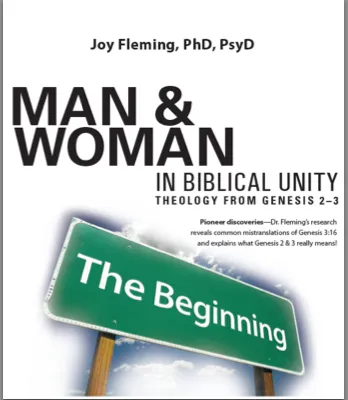
The Desirable Desire vs. a Wrongful Rule in Genesis 3:16 by Dr. Joy Fleming
excerpted from her book: Man and Woman in Biblical Unity – Theology from Genesis 2-3
Genesis 3:16, Lines c and d. Having spoken of God’s action upon her life (“I will greatly multiply your sorrowful-toil and your conception”), and having described what the experience of life with her death-body would be like (“in effort you will give birth to children”), God next describes what life will be like with her partner (Genesis 2:18 – ‘ezer kenegdo means equal partners) in a world where people are now good and evil.
God’s four last words to the woman describe life in a world of sin.
Your desire [is] for your husband,
But he shall rule over you.
These final words to the woman do not resemble the endings in the surrounding speeches to the serpent tempter and to the man. There is no shuph–shuph (bruise … bruise), shuv–shuv (return … return) equivalent, the alliterative repeating verbs that ended those two speeches.
There are two parties in Genesis 3:16, Lines c and d, but their relationship is not reciprocal. [3:16a is forced into a rigid organization (by “and… and…” prefixed to the first and third Hebrew words), yet it defies the symmetry of the parallel structure of 3:15c-d or the chiastic structure of 3:19c-f.] The author uses form to convey content in describing a relationship which is an awkward misfit.
The words and the word order of the Hebrew text are freighted with meaning. A very literal rendering would be:
And-to-man-your desire-your (line c)
And-he will-rule-over-you. (line d)
Prepositions “to” and “over” begin and end 3:16c and d. They are unreciprocal (neither “to … to …” nor “over … under …”) and incompatible. The dominant position that the man will assume is hinted at by his prominent place in the syntax (“man/he” opens each line in Hebrew). The woman’s presence in the syntax becomes almost a footnote (pronoun suffixes at the end of each line: “… your … your; … you.”).
In the first line, there is no verb in the Hebrew text. (Translators supply a verb, such as “is” or “will be.”) A noun is attributed to the woman; a verb, to the man.
Some commentators have sought to color the noun “desire” with a negative connotation. But this does not have any solid basis. “Desire” (teshuqah) simply means desire. The word is used three times in the Old Testament. In Song of Solomon 7:10, teshuqah is used of Solomon’s desire for his lover: “I am my beloved’s, And his desire is for me.” There is no negative connotation to desire for his lover. And teshuqah is not necessarily a sexual term, because it is used in a non-sexual way in Genesis 4:7. [Because of the occurrence of the words “desire” and “rule” in Genesis 3:16 and Genesis 4:7, some have taken a certain interpretation of Genesis 4:7 and made it the touchstone of their way of interpreting Genesis 3:16. Specifically, “desire” is expanded to mean “desire to overthrow.” Then that meaning is imported to Genesis 3:16 and applied to the woman—who, it is claimed, desires to overthrow the man. As one weak argument is laid upon another, according to this line of thought, he, in turn, must resist this mutiny by mastering her. Genesis is a very complex passage and hardly supplies a simple “key” to the interpretation of Genesis 3:16. For a full discussion of the relationship between Genesis 4 and Genesis 3, see the Excursus in Joy Fleming, Rhetorical Analysis of Genesis 2-3, pp. 282-295, 352-353.]
The aggressive, adversarial verb describing the action of the man (“rule” over) stands in marked contrast to the affection of the noun attributed to the woman in the preceding line.
In the context of Genesis 2-3, it seems God is essentially warning the woman, that though her desire for her husband continues to be as it had been when they were enjoying an unimpaired one-flesh communion, unfortunately, things will henceforth be different. The man has changed dramatically. This was already manifest in his new role as Accuser of God and the woman. It will be further manifest in his subsuming a new role as Ruler over the woman. Rather than “cleaving” to his wife in a face-to-face partnership, he is about to “rule over” her. This stands in contrast to the woman, the object of whose desire is, as before, her husband. Instead of ruling [A different verb is used for “ruling” in Genesis 1:26, 28 (radah) than the verb in 3:16 describing the man’s sinful “rule” (mashal)] together over the animals as they used to do, he is about to subsume her under his rulership along with the animals. This would be an expression of the independence he had declared from God. His new kingdom would be her! In so doing he would take the place of God and claim to be her new lord.
As Carol Castor Howard … puts it, “The woman wants a mate and she gets a master; she wants a lover and she gets a lord; she wants a husband and she gets a hierarch. This is the clear meaning of Genesis 3:16.” [G.B., Beyond Sex Roles: What the Bible Says About a Woman’s Place in Church and Family (Grand Rapids, MI: Baker, 1986), p. 229, quoting Carol Castor Howard.]
It is important to note that, unlike Genesis 3:15 where the enmity between the serpent and the woman was established by God, these words about man’s governing intentions are not prescriptive. For God never instructs the man to act in such a way. God’s words are descriptive of the broken harmony the woman is about to encounter.
For more: See Man and Woman in Biblical Unity – Theology from Genesis 2-3 and also subscribe and listen to The Eden Podcast Episodes 1-8. Finally please visit the Tru316 Project’s website at Tru316.com!

